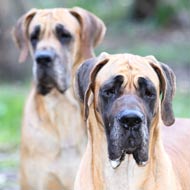DNA study sheds light on lifespan mystery

Until now, biologists have been unable to explain why the larger animals in a species tend to have shorter lives.
A new discovery could explain why larger individuals in a species tend to have shorter life spans.
Until now, biologists have been unable to explain why the larger animals in a species tend to have shorter lives - great Danes, for example, generally have shorter lives than Jack Russells.
A recent study of humans also found that taller people are more prone to diseases such as cancer.
But scientists from Glasgow and Norway now believe the answer is in the way DNA linked to ageing and lifespan changes with body size.
Telomeres are special DNA structures that all animals have at the end of their chromosomes. They are described as 'the protective plastic caps at the end of shoelaces'.
When the research team studied a population of wild house sparrows on the island on Leka in Norway, they found that the skeletally bigger house sparrows had shorter telomeres.
Telomeres erode over time and this shortening has been associated with ageing and disease. Individuals with naturally longer telomeres appear to have an advantage when it comes to health and ageing.
"Growing a bigger body means that cells have to divide more," explained Professor Pat Monaghan, regius chair of zoology at the University of Glasgow. "As a result, telomeres become eroded faster and cells and tissues function less well as a result.
"The reason why the bigger individuals have shorter telomeres might also be related to increased DNA damage due to growing faster."



 BSAVA is to partner with BVA Live (11-12 June 2026) to champion clinical research.
BSAVA is to partner with BVA Live (11-12 June 2026) to champion clinical research.